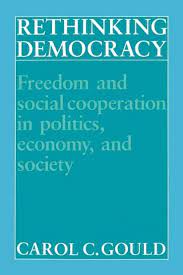Democracy Reconsidered Decades On
More important, more needed, and very much contested, democratic values and structures are increasingly under the microscope. Understanding the strengths and weaknesses of democracy in its many forms is a vitally important issue for the United States and, in many ways, the entire world. How do we govern, govern ourselves, and make good faith efforts to live fair and just lives in unfair and unjust times? There are no easy answers.
My knowledge and questions about democracy have been substantially aided of late through reading an important book, one that I missed for decades. First published in 1998 (with a big thanks to my daughter for the recommendation), Carol C. Gould’s Rethinking Democracy: Freedom and Social Cooperation in Politics, Economy and Society is a rigorously argued work of political philosophy. Gould makes bold claims, offers tightly structured arguments, and systematically advances and critiques other’s work in the field. Rethinking Democracy challenges established thinking (at least at the time it was written), and for someone new to book, clearly has made an outsize impact on the field. Be warned, though: this is not a book to skim. It requires close reading and attention. Gould is a very well-respected scholar whose work spans disciplines and centuries.
At a high-level, Gould’s agenda is this volume has multiple aims. She looks to establish democratic decision-making and processes as foundational to social and economic life, not just politics. Democracy, in other words, cannot only be found at the ballot box. It matters in the workplace and in our lives. To achieve this claim, Gould carefully builds an understanding of freedom, liberty and rights that affirm both the individualist perspective and the demands of social equality and cooperation. That is an important shift. Many think of freedom as an individual’s right to do what they want, and that this kind of freedom is essential to a democracy. Others consider freedom that can only be established through a cooperation and structured equality. Think of socialism in this example.
Gould’s argument is multi-layered. Along like lines, Gould acknowledges the power of negative and positive freedom as a construct (“no one can constrain me” and “I can do what I want”). She demonstrates the ineffectiveness of relying on the framework to construct a foundation for democracy. This takes a lot of work, for Gould does not simply propose. Instead, she summarizes thinking, considers the benefits and shortcomings of other thinkers, and constructs her arguments deliberately and with purpose. The very definitions of freedom and equality are sought. Although Gould claims the book to be constructive, not critical, it is only through her systematic work that construction takes place.
Freedom, Gould persuasively argues, is a condition for individual self-development, which is essential our purpose and lives as humans. Self-development is not atomistic and isolated. Instead, it is only possible in conditions of cooperation and participation. Democracy in a healthy state, accordingly, offers individual self-development and social cooperation. It has an ethical and ontological foundation.
Multiple books and articles have emerged in the decades since Rethinking Democracy was published, as well as fields within philosophy. Social ontology stands as a good example. One not be a philosophy student or philosopher to appreciate the potential consequences and questions that emerge from Gould’s ideas. Rethinking Democracy is a powerful work.
I plan on more reading and research, based on this book and subsequent scholarship. Learning more about how to advance democratic values strikes me as a most relevant area of inquiry. And if current affairs has one thinking, it is clear that there is much to learn and consider.
David Potash
